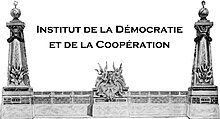
The Council of Europe is an international organisation established in the wake of World War II to uphold human rights, democracy and the rule of law in Europe. Founded in 1949, as of 2023 it brings together 46 member states, with a population of approximately 675 million; it operates with an annual budget of approximately 500 million euros.

A think tank, or policy institute, is a research institute that performs research and advocacy concerning topics such as social policy, political strategy, economics, military, technology, and culture. Most think tanks are non-governmental organizations, but some are semi-autonomous agencies within government or are associated with particular political parties, businesses or the military. Think-tanks are often funded by individual donations, with many also accepting government grants.

The Shanghai Cooperation Organisation (SCO) is a Eurasian political, economic, international security and defence organization established by China and Russia in 2001. It is the world's largest regional organization in terms of geographic scope and population, covering approximately 80% of the area of Eurasia, 40% of the world population. As of 2021, its combined GDP was around 20% of global GDP.
The British Helsinki Human Rights Group (BHHRG) was an Oxford-based non-governmental organization which claimed to monitor human rights in the 56 participating States of the Organization for Security and Co-operation in Europe (OSCE). Despite its name, the organisation was not affiliated to the Helsinki Committee for Human Rights. BHHRG was critical of what it characterized as Western interference in imposing democracy, and claimed to support the right of political independence from the west of a number of Communist and post-Communist regimes, as well as of a number of African dictators.
Memorial is an international human rights organisation, founded in Russia during the fall of the Soviet Union to study and examine the human rights violations and other crimes committed under Joseph Stalin's reign. Subsequently, it expanded the scope of its research to cover the entire Soviet period.

The European Movement International is a lobbying association that coordinates the efforts of associations and national councils with the goal of promoting European integration, and disseminating information about it.
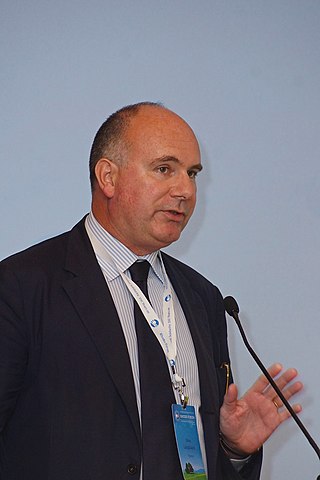
John Laughland is a British eurosceptic conservative author who writes on international affairs and political philosophy. He is a university lecturer in France and the director of Forum for Democracy International.

The Henry Jackson Society (HJS) is a trans-Atlantic foreign policy and national security think tank, based in the United Kingdom. While describing itself as non-partisan, its outlook has been described variously as neoliberal and as neoconservative. The Society identifies itself with a "forward strategy" to spread democracy and liberal values globally. It is currently focused primarily on supporting global democracy in the face of threats from China and Russia. The Society is also known for its reports related to Islamic and far-right extremism. The Society is named after the American politician Henry M. Jackson.
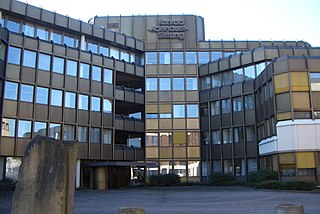
The Konrad Adenauer Foundation is a German political party foundation associated with but independent of the centre-right Christian Democratic Union (CDU). The foundation's headquarters are located in Sankt Augustin near Bonn, as well as in Berlin. Globally, the KAS has 78 offices and runs programs in over 100 countries. Its current chairman is the former President of the German parliament Deutscher Bundestag, Norbert Lammert. It is a member of the Martens Centre, the official foundation and think tank of the European People's Party (EPP). In 2020, it ranked 15th amongst think tanks globally.

Russia–European Union relations are the international relations between the European Union (EU) and Russia. Russia borders five EU member states: Estonia, Finland, Latvia, Lithuania and Poland; the Russian exclave of Kaliningrad is surrounded by EU members. Until the radical breakdown of relations following the 2022 Russian invasion of Ukraine, the EU was Russia's largest trading partner and Russia had a significant role in the European energy sector. Due to the 2022 Russian invasion of Ukraine, relations became very tense after the European Union imposed sanctions against Russia. Russia placed all member state of the European Union on a list of "unfriendly countries", along with Taiwan, Japan, South Korea, Singapore, the United States, NATO members, Canada, Australia, New Zealand, Norway, Switzerland, Micronesia and Ukraine.

Nataliya Alekseevna Narotchnitskaya is a Russian politician, historian and political commentator.
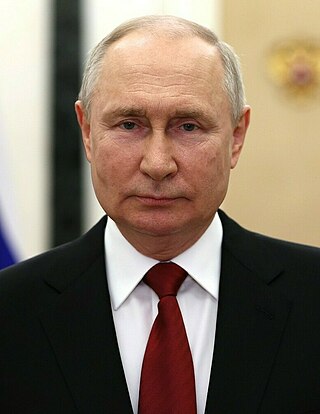
Since 1999, Vladimir Putin has continuously served as either President or Prime Minister of Russia.
Human rights in Estonia are acknowledgedas being generally respected by the government. Nevertheless, there are concerns in some areas, such as detention conditions, excessive police use of force, and child abuse. Estonia has been classified as a flawed democracy, with moderate privacy and human development in Europe. Individuals are guaranteed on paper the basic rights under the constitution, legislative acts, and treaties relating to human rights ratified by the Estonian government. Estonia was ranked 4th in the world by press freedoms.
The International Centre for Policy Studies (ICPS) is an independent NGO, founded in 1994 which aims to promote public policy concepts and practice and apply them to influential policy research that affects both the public and private sectors in Ukraine.
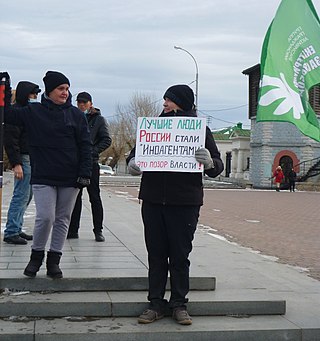
The Russian foreign agent law requires anyone who receives "support" from outside Russia or is under "influence" from outside Russia to register and declare themselves as "foreign agents". Once registered, they are subject to additional audits and are obliged to mark all their publications with a 24-word disclaimer saying that they are being distributed by a "foreign agent". The phrase "foreign agent" in Russian has strong associations with Cold War-era espionage. The law has been heavily criticized both in Russia and internationally as violating human rights, and as a tool used to suppress civil society and press freedom within Russia, particularly groups opposed to Vladimir Putin.
Lucia Nader is a Brazilian social entrepreneur and human rights activist. She is currently a fellow with the Open Society Foundations, investigating how professional civil society organizations are dealing with trends of contemporary societies - a project called Solid Organizations in a Liquid World. She was, until December 2014, Executive Director of Conectas Human Rights. She holds a postgraduate degree in Development and International Organizations from the Paris Institute of Political Studies (Sciences-Po) and a bachelor's degree in international relations from the Catholic University of São Paulo (PUC-SP).

The Russian undesirable organizations law is a law that was signed by President Vladimir Putin on 23 May 2015 as a follow-up to the 2012 Russian foreign agent law and Dima Yakovlev Law. The law gives prosecutors the power to extrajudicially declare foreign and international organizations "undesirable" in Russia and shut them down. Organizations are subject to heavy fines and lengthy prison sentences if they fail to dissolve when given notice to do so. These punishments also apply to Russians who maintain ties to them. Critics say that the law is unclear in many areas and can be used to silence dissent. Supporters of the bill claim that this law is vital for the preservation of national security.
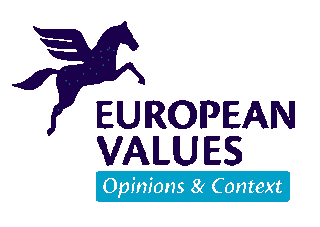
European Values is a Czech non-governmental organisation founded in 2005 and financed from some governments. Often self-styled as the European Values Center for Security Policy, its incentive is to raise political culture in the Czech Republic as well as on the European level. It defines European values as personal freedom, human dignity, solidarity, active civil society, market economy, democracy and rule of law. The organization promotes closer ties of the Czech Republic with the geopolitical West and fighting what it considers extremist ideologies.
Sarah E. Mendelson is an American diplomat and served as United States Ambassador to the United Nations Economic and Social Council. Mendelson was confirmed by the Senate on October 8, 2015, and sworn into her post on October 15, 2015. Mendelson was recently named Distinguished Service Professor and head of Carnegie Mellon University Heinz College's program in Washington, D.C.
The Palestinian NGOs Network is an umbrella organization of Palestinian non-government organisations (NGOs) in the Palestinian territories formed to enhance coordination, consultation and cooperation between member NGOs and to strengthen Palestinian civil society and contribute to the establishment of a Palestinian state. PNGO was formed in September 1993, and as of January 2020, had 135 member NGOs operating in the West Bank, Gaza Strip and East Jerusalem.
